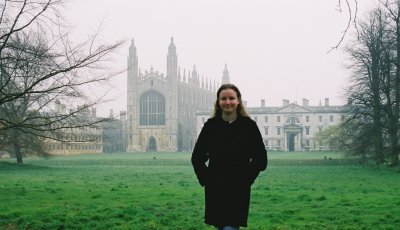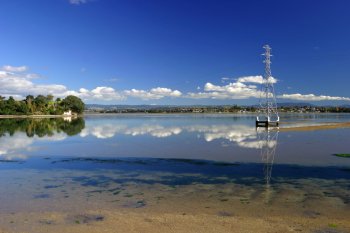Career interview: Business analyst
Anita King is a business analyst working for the New Zealand electricity company TrustPower. Before she started there, she did a PhD in theoretical physics at Cambridge University and had planned to be an academic.
"I never expected to be working as a businesswoman, until a couple of years ago," says Anita King, business analyst for a New Zealand electricity retailer and generator. "As a child, I was going to be a [medical] doctor, and through my teens and into my twenties I intended to be a scientist. I was turned off economics very quickly in high school, and found the management paper I did as an undergraduate painful."

Anita in front of King's College, Cambridge.
Not that she found mathematics much more exciting. "While I considered maths a necessary evil, I found it boring and easy at high school. Skipping ahead a year didn't help, until I got to the notoriously difficult 'Mathematics with Calculus' Bursary (equivalent to A-levels) course. Suddenly there was a bit more challenge, and it started tying in with other subjects I liked better, like physics."
Heading to university, Anita had to narrow her subjects down — a triple major in maths, physics, and chemistry simply wasn't an option, especially when she jumped straight in to second year courses, bypassing the first year pre-requisites. A large number of maths courses were required for physics, so it was a straight-forward decision to drop chemistry and do a double major in mathematics and physics. "I found mathematics was a vital tool for physics; and theoretical physics, which I was most interested in, was so mathematical it actually fell on the border between maths and physics."

A misty morning in Waikato district — the right setting for studies.
Four years later, she had a BSc in maths and physics, and an MSc in applied mathematics from Waikato University. A year of that was spent writing her Master's thesis on gravitational radiation, also the subject of her Plus article Squeeze me, stretch me. An academic career was calling and so the next step was to do a PhD. Like many New Zealanders her age, she was also ready to do the traditional OE (Overseas Experience — like a gap year) and spend time living in England. "It made good sense to combine the two, especially when I could get a scholarship to pay my living costs. My fiancé took some convincing to follow me though!"
She applied to the General Relativity research group at the University of Cambridge, and for every scholarship she could find. The funding was a vital factor as the three year degree would cost the same as an average house in New Zealand. "I was very fortunate — I could confirm my enrolment at Cambridge before a scholarship came through as my parents were willing to loan me their retirement fund. As it happened, I was awarded a generous Bright Future Scholarship about two months before I was due to leave, keeping Mum and Dad's retirement fund safe."
The PhD was not everything Anita had hoped for. "Within a year, I knew academia was not for me, although it probably didn't help that neither my supervisor nor my project were the best fit for my personality. I spent most of my time writing a computer program to solve a particular version of Einstein's equations of general relativity, and couldn't seem to find all the bugs that were stopping it working. It turns out the version of equations I was using can't be solved by a computer program, and the main conclusion of my thesis was: Don't use my equations."

Anita with Albert Einstein at Madame Toussauds in London.
That left the question of what to do next, which has not proven so easy to answer. "Once I decided not to continue with an academic career, all I knew about what I did want to do was that it should be as far away from mathematics as practical. Apparently this is a fairly normal reaction to doing a PhD, according to other people I've talked to!"
Talking with the careers counsellors at Cambridge University, she initially settled on policy analysis, then changed to management consultancy. The latter involved more mathematics but the urge to rebel against the subject had subsided a little by then. Management consultancy offered variety, the opportunity to work with highly intelligent and motivated people, and the glamour of travel and a high-powered corporate career. "I started the process of applying to the big management consultancy companies that had a presence in New Zealand while I was still in England, and passed the first couple of rounds with McKinsey. There was some delay with BCG, so they put my application on hold until the Australasian recruitment round started."
Back in New Zealand, after a break catching up with family and friends, finding a job became more pressing. "I was quite jealous when my fiancé got a job in his field on his first day of looking, especially since I'd already been looking for a while without much luck." Money was running short, Anita had missed out on a position at McKinsey, and the BCG application was still on hold. "So I began looking for graduate programs, preferably based in Hamilton or Tauranga, and preferably in the electricity industry which had more appeal than many other sectors." By luck she found the graduate position at TrustPower, an electricity generator and retailer based in Tauranga, the day before applications closed. "I quickly put my application together and was duly invited for an interview, then offered the position." She started about a week later.

Tauranga habour in New Zealand.
The graduate program at TrustPower involves spending a year in each of three different areas of the business working as a business analyst. Most of the people on the program just have a first degree, typically either in maths, physics, engineering or business. "Those with the business studies background tend to be better at coming up with ways to help the business make more money, whereas the mathematicians and engineers tend to try and make the business processes run more efficiently." Anita is now in her second of the three roles, working in the energy trading office. For her first role she worked in reconciliation.
"Reconciliation, where I started out, is all about matching what we think we should be charged with what our suppliers have charged us." Sounds simple but, as you can probably guess, it's not. The suppliers Anita is referring to are 30 electricity distribution companies covering New Zealand. They charge based on the number of days a customer is connected, how much electricity the customer uses, what the peak rate of electricity usage is (known as peak demand) and possibly any transformers or similar devices the customer might use. Each customer group — residential, commercial, industrial, and sub groups of these — have their own charging structures, and each distribution company have their own variations on the charges too. Multiply that by hundreds of thousands of customers and finding the errors becomes more challenging, especially in the short period between receiving the invoice and its due date.
"At the moment, I am working in a middle office role in the energy trading department. This is a policeman-type role, keeping an eye on the people who do the energy trading and making sure they don't go outside their boundaries, to make sure Enron-style collapses don't happen." There is a lot of reporting both on where this part of the company is financially, and the risks it is likely to face in the future. The role involves calculating the amount due on hedge contracts — a contract where an agreement is made to pay a fixed price for a fixed amount of electricity at some point in the future (you can read more about hedging in the Plus article Rogue trading?).
"A few years before I started the risks of buying electricity on the market weren't very well understood, and when hedge prices went up, most companies decided not to bother renewing their hedges, leaving themselves very exposed. When the prices subsequently went very high because there was a drought (much of New Zealand's electricity is generated by hydro power), they had no protection and it was enough to bankrupt one of the retailers. Pretty much everyone in the industry considers hedging essential now."

The spillway of a hydroelectric power station.
Anita has also worked on a number of other projects around the business. "At the moment, I'm coming up with a better way to estimate how much electricity an individual customer has used, to improve both our billing and our purchasing accuracy. I'm part of a big project team evaluating potential new major suppliers and I also have a number of smaller projects on the go, including learning about New Zealand's natural gas market. I may also be doing work in the future to optimise how we design the storage for new hydro-generation schemes."
"As a business analyst, you could say my basic role is to provide analytical support to management. It's the business analyst's role to provide any numbers they need to support them in monitoring their area of the business and help in their decision-making. This may be as simple as pulling number out of the database, or as complex as designing a model of a non-linear multi-variable situation with feedback loops." An example of one of those complex situations is maximising the revenue from a generation station. This depends on the water inflow, storage, generation and price, and generation and storage are in turn dependent on themselves and the inflows.
Business analysts can often be expected to have a broader picture of the processes of the whole business, so that when they change and improve them they know what impact that will have on the rest of the company. "The analytical skills I learnt from studying maths have been helpful, as have the problem defining and problem solving skills I learnt in physics. I could do with a better knowledge of statistics and computer programming though. While we have a IT department for the heavy-duty programming, I need to be able to write basic Visual Basic and SQL code to get the data I need from the database, and automate some of our processes."
Anita has managed not to sacrifice too many of the features that attracted her to her earlier career choice of management consultancy. "I get variety within my job by taking on different projects — there may even be more variety than in consultancy since the nature of each project can be very different, and I'm usually working on more than one at once. As for the people — I've had some brilliant lunch and morning-tea conversations with some very smart people; even better than any I've had at a university." There is somewhat less travel involved, although she did get to go four-wheel-driving through a pine forest and around small lakes and canals in the process of visiting a generation scheme earlier this year.

A perfect landscape for four-wheel-driving.
The natural career path for a business analyst could involve more senior business analyst positions, sideways steps to other parts of the business, other businesses within the energy industry, or indeed any other business-like entity (including, for example, the local council or hospital). It can also be a step on the management path. Anita, however, has other plans.
"My ultimate aim — at the moment at least — is to work for the International Energy Agency or similar. To do that, I'm going to get a good grounding in energy businesses, perhaps moving on to a small biomass company or something like that in a couple of years, then maybe an energy consulting firm. Once I understand the desires and problems of the energy industry, I'll get an energy policy job in New Zealand to get policy experience before applying for the international positions." It looks like Anita may yet fit in both the consulting and the policy careers she had decided to forego. "You may yet see me back on the European side of the planet!"
About the author
Anita King (nee Barnes), who has written a number of articles and book reviews for Plus in the past, interviewed herself for this article!